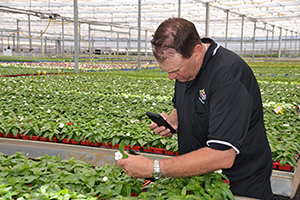Biosecurity Extension Community meets again
The members of the Biosecurity Extension Community (BEC) met on 17 June to hear insights from a major incursion for the WA vegetable industry, tomato potato psyllid (TPP) and the benefits of the Biosecure HACCP program for the nursery industry.
The online meeting was attended by more than 50 people supporting biosecurity programs for growers across plant industries, government and the community including urban biosecurity practitioners.
The BEC members heard about the implementation of the BioSecure HACCP Guidelines for managing biosecurity in nursery production from John McDonald, National Biosecurity Manager at Greenlife Industry Australia.
John explained how the industry owned, independently audited system became the first, and only, non-government plant market access system and the continuing benefits that the initiative provides to Australia.
Effective record keeping is at the heart of the widely used system. Activities undertaken every day in the nursery, including crop monitoring, pest surveillance, inspection of inputs and vehicles and weed monitoring are recorded in a fully automated web-based platform that is easy for growers to use.
Acknowledging the usefulness of the Greenlife system, participants discussed the possibility of other industries adopting Biosecure HACCP or elements of the program. It was agreed that the program’s strength is the way it is integrated into the industry’s Best Management Practice Guidelines, making producer biosecurity practices part of everyday management.
The extraordinary demands of the tomato potato psyllid incursion detected in Perth in February 2017 was the subject of the second presentation, delivered jointly by Callum Fletcher, Biosecurity Coordinator at AUSVEG, and Sonya Broughton, Chief Plant Protection Officer for Western Australia.
The forum participants heard about challenges posed by the discovery of the insect in an urban area, how it was delimited by surveillance efforts and about the scale of the efforts that went into the response that was established prior to the decision that the exotic pest was not eradicable. Between 80 and 120 personnel worked on the response each day, at the State Coordination Centre at the WA Department of Agriculture and Food offices in South Perth and nine Forward Command Posts in WA.
The toll on those involved in the response from both industry and government was emphasised, as well as the ongoing costs in terms of interstate market access restrictions.
The forum participants benefited from hearing about the collaboration between government and industry that was required in both of the case studies presented at the meeting.
For more information contact Dr Jo Luck jo.luck@horticulture.com.au

